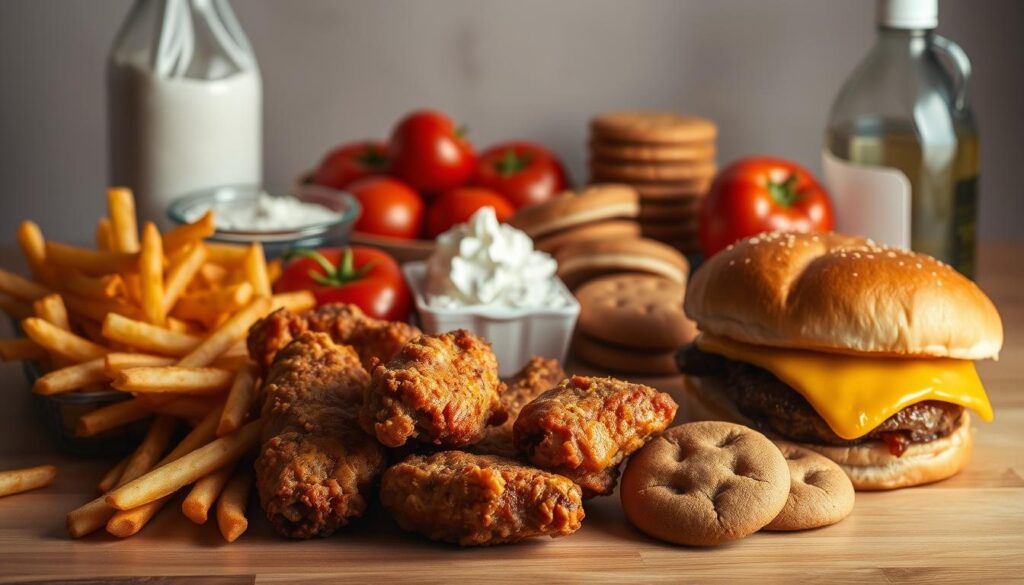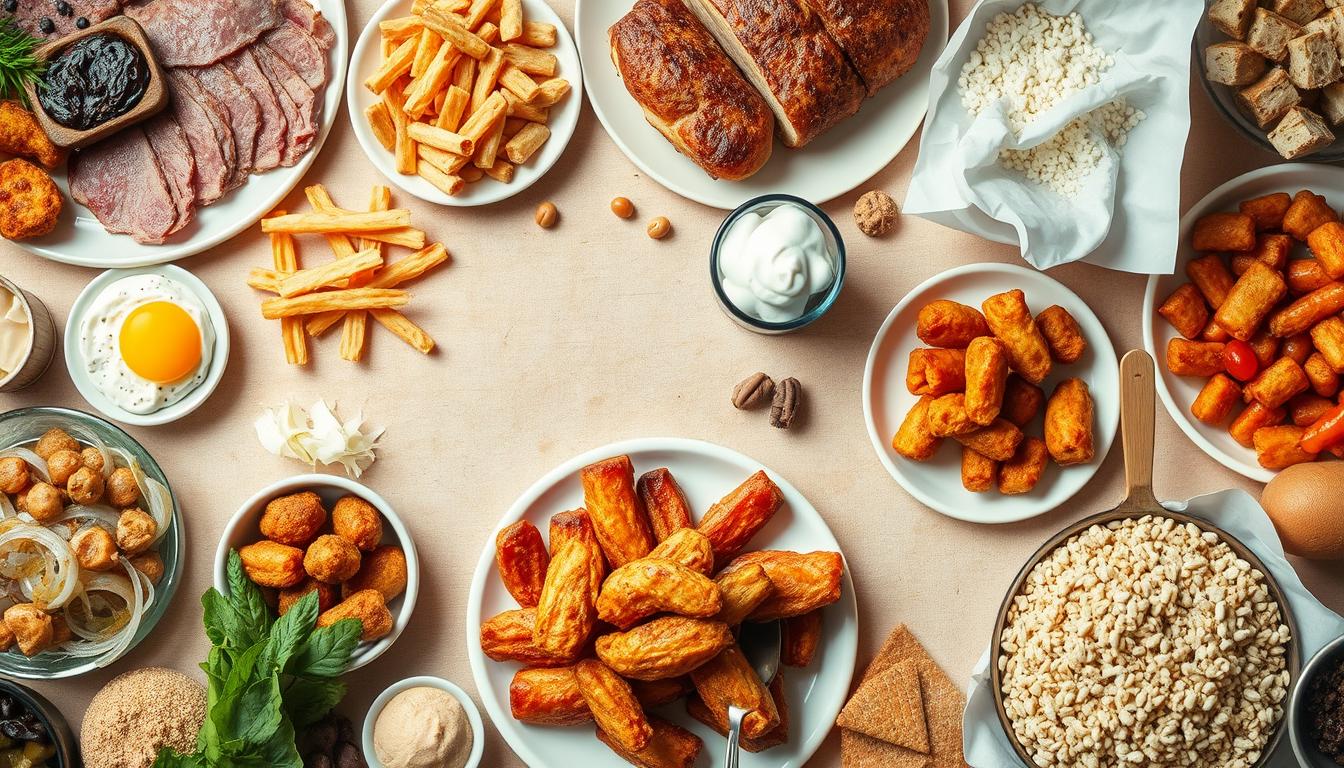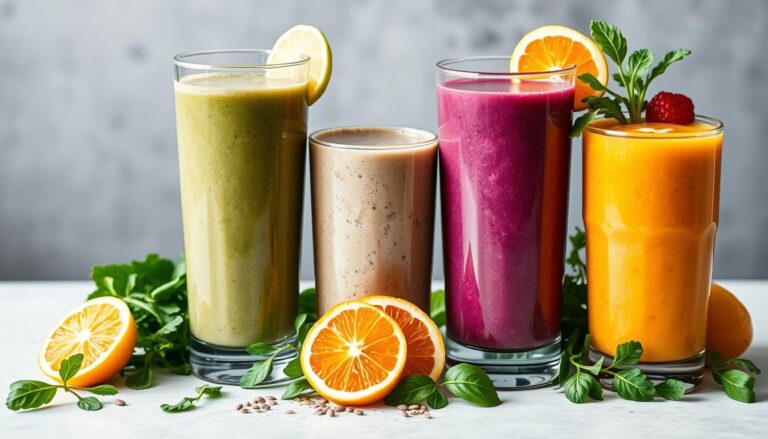Exploring the world of inflammatory foods has shown me how our diet affects our health. Some foods can cause inflammation, leading to serious diseases like obesity and heart disease1. It’s vital to know which foods to avoid to follow an anti-inflammatory diet. This diet can help lower blood pressure and improve mental health1.
Knowing how inflammatory foods harm our health is key. Foods high in saturated fats, like those in the Western diet, can cause inflammation1. Diets like the Mediterranean and DASH diets focus on whole foods. They offer benefits similar to anti-inflammatory drugs1. Making smart food choices can lower disease risk and improve our well-being, essential for a healthy life.
Key Takeaways
- Inflammatory foods can trigger inflammation in the body, leading to chronic diseases.
- An anti-inflammatory diet can help lower blood pressure and boost mental health and cognitive function1.
- Foods high in saturated fats, such as those found in the traditional Western diet, can contribute to inflammation1.
- Whole, unprocessed foods, such as those found in the Mediterranean diet and DASH diet, can provide benefits similar to nonsteroidal anti-inflammatory drugs like ibuprofen1.
- Understanding which inflammatory foods to avoid is essential for maintaining a healthy lifestyle and reducing the risk of chronic diseases.
- Incorporating an anti-inflammatory diet into our lifestyle can promote overall well-being and reduce the risk of certain health problems1.
- A diet rich in antioxidants, such as the one found in the Mediterranean diet, may help reduce the risk of certain cancers2.
Understanding Food-Related Inflammation in Your Body
Inflammation is how our body reacts to sickness, injury, or infection3. But, when it lasts too long, it can cause serious health issues. Knowing how diet affects inflammation is key to staying healthy.
It’s important to spot the signs of inflammation like redness, swelling, pain, and heat4. Eating right can help fight inflammation. On the other hand, bad food choices can make it worse. We should eat whole foods and avoid processed ones.
Let’s look at some important points about diet and inflammation:
- Long-term inflammation is linked to diseases like obesity, metabolic syndrome, and heart disease4.
- Eating healthy, like the Mediterranean diet, can lower inflammation4.
- Foods like fatty fish and fruits are full of antioxidants and fight inflammation4.

By understanding diet and inflammation, we can start to reduce inflammation and improve our health3.
Common Inflammatory Foods to Avoid
Exploring inflammatory foods is key to understanding what can trigger inflammation in our bodies. Foods like processed items, added sugars, refined carbs, and industrial seed oils are common culprits. These can cause blood sugar spikes, leading to insulin resistance and diabetes, which are linked to inflammation5. The typical American diet also has too much omega-6 to omega-3 ratio, causing more inflammation5.
Processed sugars are big offenders, releasing inflammatory cytokines6. Refined carbs, like white flour and rice, are linked to obesity and chronic diseases6. Too much omega-6 fatty acids, found in oils like corn and soy, also produce pro-inflammatory chemicals6.
Knowing which foods cause inflammation is crucial. We should avoid or limit them in our diets. Making smart food choices can lower our risk of chronic diseases and improve our health. Here are some examples of foods to avoid:
- Processed meats, such as hot dogs and sausages
- Commercial baked goods, which often contain added sugars and refined carbohydrates
- Foods high in added sugar, such as sugary drinks and candy
- Industrial seed oils, such as corn and soybean oil

By being mindful of our food choices, we can lower inflammation risk and live healthier56.
Hidden Sources of Inflammatory Foods in Your Diet
Exploring inflammatory foods reveals some common culprits are easy to miss. Hidden sources of inflammation lurk in sauces and dressings with lots of sugar and trans fat7. These can spark inflammation in our bodies, making it key to spot and steer clear of them.
Common inflammatory foods in your diet include processed and ultra-processed items, added sugars, and refined carbs. These can trigger inflammation and should be cut down or ditched. The average American consumes about 17 teaspoons of added sugar daily7, far exceeding the daily limit.
Here are some examples of foods that cause inflammation:
- Processed meats, such as hot dogs and sausages
- Refined carbohydrates, such as white bread and sugary snacks
- Foods high in added sugars, such as soda and candy
Knowing these hidden sources of inflammation and avoiding them is crucial. By choosing our food wisely and cutting down on inflammatory foods, we can lower our risk of chronic diseases and boost our health8.

Being mindful of our food choices can help us fight inflammation and improve our health. It’s about finding balance and making smart choices to dodge hidden sources of inflammation and inflammatory foods in your diet.
The Science Behind Why These Foods Cause Inflammation
Knowing the science behind inflammation helps us make better food choices. The gut-inflammation connection is key to our health. Foods like refined carbs, processed meats, and alcohol can start inflammation. This can lead to health problems like metabolic disorders and heart disease9.
Sugar in our diet can also raise blood inflammatory markers10. Eating red and processed meats can increase inflammation and even raise the risk of colon cancer10. The oxidative stress from these foods can cause long-term inflammation. This is linked to diseases like diabetes, kidney disease, and autoimmune issues10.
Advanced glycation end products (AGEs) are another way foods can cause inflammation. Refined carbs, with their high glycemic index, can increase AGEs and lead to inflammation10. To fight inflammation, we should eat less of these foods. Instead, we should focus on whole foods, fruits, and veggies.
By learning about the science behind inflammation and choosing our food wisely, we can lower our risk of chronic diseases9. The gut-inflammation connection and the effects of oxidative stress and advanced glycation end products are important when planning a diet to reduce inflammation10.
Better Alternatives to Your Favorite Inflammatory Foods
Making dietary changes can greatly reduce inflammation. Adding anti-inflammatory foods to your meals can help. For example, swapping charcuterie boards for vegetable slices and hummus is a good idea, as suggested by the second source11.
Also, adding healthy food options to your diet is beneficial. Foods like fatty fish, such as salmon and sardines, are full of omega-3 fatty acids. These are known to reduce inflammation12. Broccoli is another great choice, as it’s packed with sulforaphane. This compound lowers inflammation by reducing harmful substances in the body12.
- Berries, which may help delay cancer development and progression12
- Avocados, which have been shown to reduce inflammatory markers12
- Green tea, which has been associated with a reduced risk of heart disease, cancer, and obesity12
By adding these foods to your diet, you can fight inflammation and improve your health. Start by making small changes. Swap out one or two inflammatory foods for alternatives to inflammatory foods and notice the difference11.
Creating Your Anti-inflammatory Eating Plan
To make a good anti-inflammatory eating plan, focus on meal planning. This keeps your diet healthy and lowers inflammation. Your meal plan should have foods like dark leafy greens, nuts, seeds, fish, whole grains, and fruits and veggies that fight inflammation13.
A Mediterranean diet is a great choice. It’s full of omega-3s, vitamin C, and fiber. These are all good for fighting inflammation14.
When you make your shopping list, add foods with antioxidants and anti-inflammatory compounds. Think about turmeric, ginger, and olive oil.
Cooking methods matter too. Choose gentle ways like steaming or roasting to keep your food’s nutrients. Stay away from deep-frying, as it can raise inflammation14.
By using these tips, you can make an anti-inflammatory eating plan that fits you. It will be tailored to your tastes and needs.
- Dark leafy greens, such as spinach and kale
- Nuts and seeds, especially walnuts
- Fatty fish, like salmon and tuna
- Whole grains, such as quinoa and brown rice
- Fruits and vegetables, like blueberries, broccoli, and citrus fruits
Conclusion: Taking Control of Your Health Through Better Food Choices
The foods we eat greatly affect our health and happiness15. Eating anti-inflammatory foods can lower chronic inflammation and reduce health risks16. These foods improve heart health and brain function, showing the power of anti-inflammatory eating.
Making small diet changes can make a big difference16. Adding more anti-inflammatory foods like fruits, greens, and healthy fats can help control health16. Also, cutting down on processed, sugary, and fatty foods boosts your body’s fight against inflammation.
Health isn’t one-size-fits-all17. Finding the right diet for you means understanding your needs and trying different anti-inflammatory foods16. With the right mindset and better food choices, you can live a healthier, happier life.
FAQ
What is inflammation and how does it relate to my diet?
What are the common inflammatory foods I should avoid?
How can I identify hidden sources of inflammatory foods in my diet?
What are the scientific reasons behind why certain foods cause inflammation?
What are some better alternatives to my favorite inflammatory foods?
How can I create an effective anti-inflammatory eating plan?
Source Links
- https://health.unl.edu/health-benefits-anti-inflammatory-diet-10-foods-eat-and-6-avoid/ – Health benefits of an anti-inflammatory diet: 10 foods to eat and 6 to avoid | University Health Center
- https://www.medicalnewstoday.com/articles/320233 – Anti-inflammatory diet: Food list and tips
- https://www.uchicagomedicine.org/forefront/gastrointestinal-articles/2020/september/what-foods-cause-or-reduce-inflammation – Foods that Cause Inflammation & How to Reduce Inflammation – UChicago Medicine
- https://www.hopkinsmedicine.org/health/wellness-and-prevention/anti-inflammatory-diet – Anti Inflammatory Diet
- https://www.houstonmethodist.org/blog/articles/2022/jun/5-types-of-foods-that-cause-inflammation/ – 5 Types of Foods That Cause Inflammation
- https://www.arthritis.org/health-wellness/healthy-living/nutrition/foods-to-limit/8-food-ingredients-that-can-cause-inflammation – No title found
- https://health.clevelandclinic.org/foods-that-can-cause-inflammation – 5 Top Foods That Cause Inflammation
- https://www.health.com/foods-to-avoid-that-cause-inflammation-8758950 – 10 Foods You Didn’t Know Could Be Causing Inflammation
- https://www.healthline.com/nutrition/6-foods-that-cause-inflammation – 5 Foods That Cause Inflammation
- https://www.medicalnewstoday.com/articles/foods-that-cause-inflammation – What to know about foods that cause inflammation
- https://www.webmd.com/diet/anti-inflammatory-diet-road-to-good-health – Anti-Inflammatory Diet: Road to Good Health?
- https://www.healthline.com/nutrition/13-anti-inflammatory-foods – The 13 Most Anti-Inflammatory Foods You Can Eat
- https://www.eatingwell.com/article/7894310/anti-inflammatory-meal-plan-for-beginners/ – 7-Day Anti-Inflammatory Meal Plan for Beginners, Created by a Dietitian
- https://www.healthline.com/health/rheumatoid-arthritis/seven-day-meal-plan – Anti-Inflammatory Meal Plan: Recipes for 7 Days
- https://nutrition.org/inflammation-what-is-it-and-how-can-my-diet-and-behavior-affect-it/ – Inflammation: What Is It, and how can my diet and behavior affect it? – American Society for Nutrition
- https://www.awakeningstreatment.com/blog/anti-inflammatory-diet-improve-life/ – How an Anti-inflammatory Diet Can Improve Your Mental Health!
- https://pmc.ncbi.nlm.nih.gov/articles/PMC10057655/ – The Role of Diet as a Modulator of the Inflammatory Process in the Neurological Diseases




